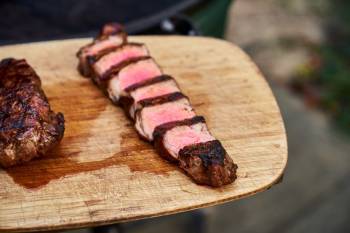SYDNEY, 25 August 2021: The company driving the commercialization of the Asparagopsis seaweed livestock ingredient has hit a major milestone, applying the technology in a commercial feedlot and delivering the world’s first lower-methane steaks thanks to the superstar seaweed.
Global IP holder for Asparagopsis, FutureFeed, celebrated the occasion by unveiling the world’s first lower emissions steaks thanks to Asparagopsis seaweed with trial collaborators the University of New England, Australian Country Choice and Woolworths.
The powerhouse seaweed behind the lower emission beef is Asparagopsis, red seaweed that naturally prevents the formation of methane by inhibiting a specific enzyme in the gut of livestock during digestion and has been proven to lower methane emissions by over 80 percent.
FutureFeed CEO Dr Regan Crooks said this trial and these steaks mark a significant moment in the quest to lower-methane meat with the solution ready for the beef feedlot market.
“It’s incredible to see the transition of a solution from science to a commercial reality and I think that’s something worth celebrating These steaks represent the launch of the technology for the feedlot market and we are anticipating many more steaks on plates in Australia and around the world that are certified by FutureFeed,” Dr Crooks said.
“Climate change is happening now and the IPCC reported last week that methane emissions in the atmosphere are at their highest levels in hundreds of thousands of years. We expect this will lead to increasing pressure on our sector and it is timely that we are able to provide a solution that has now been proven, in a commercial setting, to significantly reduce methane.”
“The science supports the safety and efficacy and we now look to the seaweed growers making incredible progress locally and globally for what we anticipate being rapidly increasing supply,” Dr Crooks said.
The IP was developed in collaboration with CSIRO, Meat & Livestock Australia Limited and James Cook University, FutureFeed licenses seaweed farmers around the world to grow and sell the seaweed.
FutureFeed’s Chief Scientist, Dr Rob Kinley, said the 64 head trial at University of New England’s Tullimba Smart Farms was significant as it shows the transition from science into commercial setting.
Woolworths Group is an investor in FutureFeed and collaborated on the commercial trial.
Anna Speer, Managing Director of Woolworths Group’s red meat business Greenstock, said customers are increasingly looking to supermarkets and industry to help them live and shop more sustainably.
"We’re backing FutureFeed to help Australia’s cattle farmers continue to produce some of the world’s best beef with a lower emissions profile,” Ms Speer said.
“We want to play our part in helping agriculture harness innovation for a low carbon future and we’re hopeful this trial marks an important step in the future of beef production."
Australian Country Choice CEO, Anthony Lee, said the company was proud to be part of the trial and is encouraged to see the technology applied in a commercial setting.
“We love the idea of FutureFeed’s Asparagopsis solution. It’s a natural ingredient that can be incorporated in daily mixed rations. The beauty is in the simplicity – people want what they eat of be natural and this is. It’s also backed by strong science that gives confidence that it’s safe to use and it works,” Lee said.
“The reason the red meat industry is ahead of others in reductions is because of our commitment to innovate and be proactive.”
Dr Crooks said the emission reductions achieved using Asparagopsis has the potential to be incorporated into commercial beef brand claims.
“We anticipate there being a number of ways producers can monetise the benefits of using Asparagopsis, through the open carbon market, the sovereign carbon market or through a premium product claim for consumers,” Dr Crooks said.
“FutureFeed is developing a Certified Trade Mark and the standards that underpin it to give the value chain and consumers confidence that what they’re buying meets the standards our science commands.”
“We’re also developing a digital traceability platform enabled by blockchain technology to allow certified operators to calculate their reductions based on Asparagopsis use.”























